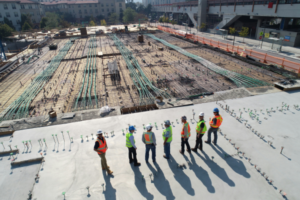Challenges in Construction Project Management
Managing construction projects can be a daunting task. From coordinating multiple teams, tracking progress, ensuring resource availability, to maintaining budgets and schedules, construction project management requires careful planning and execution. However, it is not without its challenges.
One of the major challenges faced by construction project managers is the lack of real-time visibility into project status and progress. Traditional manual methods of project management, such as spreadsheets and paper-based systems, often lead to delays and inaccuracies in data collection and reporting. This can result in miscommunication, project delays, and increased costs.
Another challenge is the complexity of managing the supply chain in construction projects. With numerous suppliers, subcontractors, and vendors involved, coordinating the procurement and delivery of materials and equipment can be a logistical nightmare. Manual processes for managing the supply chain can lead to inefficiencies, errors, and delays in project timelines.
Furthermore, effective communication and collaboration among project teams and stakeholders are crucial for successful project execution. However, with dispersed teams, remote work, and multiple stakeholders, communication can become fragmented and disjointed. This can lead to misunderstandings, delays in decision-making, and a lack of accountability.
To overcome these challenges and streamline construction project management, construction companies are increasingly turning to ERP software solutions.
Benefits of Using ERP Software in Construction Projects
Implementing ERP software in construction projects offers a wide range of benefits that can transform the way construction companies operate. Let’s explore some of the key benefits of using ERP software in construction project management.
1. Enhanced Efficiency
ERP software streamlines and automates various project management processes, eliminating the need for manual data entry and paperwork. This saves time and reduces the chances of errors, resulting in improved efficiency across the project lifecycle. With automated workflows, project managers can prioritize tasks, track progress, and allocate resources more effectively.
By providing real-time visibility into project status, ERP software enables construction companies to identify bottlenecks, address issues promptly, and make data-driven decisions. This leads to improved project efficiency, reduced rework, and increased productivity.
2. Improved Collaboration and Communication
Effective collaboration and communication are vital for successful construction projects. ERP software facilitates seamless communication among project teams, subcontractors, suppliers, and clients. With a centralized platform, stakeholders can access project information, share updates, and collaborate on tasks in real time.
ERP software also enables document sharing and version control, ensuring that all stakeholders have access to the latest project documentation. This eliminates confusion, reduces the risk of errors, and improves accountability.
3. Accurate Budgeting and Cost Control
Budget overruns are a common challenge in construction projects. ERP software provides robust budgeting and cost control features, enabling project managers to set accurate budgets, track expenses, and monitor costs throughout the project lifecycle.
By integrating financial data with project management processes, ERP software provides real-time visibility into project costs, allowing project managers to identify cost-saving opportunities, optimize resource allocation, and make informed decisions to keep projects within budget.
4. Streamlined Supply Chain Management
Managing the supply chain in construction projects can be complex and time-consuming. ERP software simplifies supply chain management by automating procurement processes, tracking inventory levels, and streamlining vendor management.
With real-time visibility into the supply chain, construction companies can optimize material procurement, minimize stockouts, and reduce lead times. This ensures that materials and equipment are available when needed, reducing project delays and improving overall project efficiency.
5. Data-driven Decision Making
ERP software collects and analyzes project data, providing valuable insights that can drive data-driven decision making. By leveraging analytics and reporting capabilities, construction companies can identify trends, monitor project performance, and make informed decisions to optimize project outcomes.
From tracking project progress to analyzing resource utilization, ERP software empowers project managers with the data they need to make proactive decisions, mitigate risks, and ensure project success.
Key Features of ERP Software for Construction Management
ERP software designed specifically for the construction industry comes with a range of features and functionalities tailored to address the unique needs of construction project management. Let’s explore some key features of ERP software for construction management.
1. Project Planning and Scheduling
Effective project planning and scheduling are essential for successful construction projects. ERP software provides tools for creating project plans, defining project milestones, and scheduling tasks. Project managers can allocate resources, set dependencies, and track progress to ensure projects stay on track.
With real-time updates and notifications, project managers can proactively address delays, adjust schedules, and optimize resource allocation to meet project deadlines.
2. Budgeting and Cost Control
ERP software enables accurate budgeting and cost control by integrating financial data with project management processes. Project managers can create detailed budgets, track expenses, and monitor costs throughout the project lifecycle.
By analyzing actual costs against budgeted costs, ERP software provides insights into cost variances, allowing project managers to take corrective actions to keep projects within budget.
3. Materials Management
Managing materials and equipment is critical to construction project success. ERP software provides tools for tracking inventory levels, managing purchase orders, and optimizing the procurement process.
With real-time visibility into material availability and usage, construction companies can minimize stockouts, reduce lead times, and ensure that materials are delivered to the right place at the right time.
4. Subcontractor Management
Many construction projects involve subcontractors and vendors. ERP software streamlines subcontractor management by providing tools for managing contracts, tracking performance, and processing payments.
By centralizing subcontractor information and automating payment processes, ERP software simplifies subcontractor management, improves accountability, and reduces administrative overhead.
5. Document Management
Construction projects generate a vast amount of documentation. ERP software offers document management features that enable centralized storage, version control, and secure access to project documentation.
With document sharing capabilities, project teams and stakeholders can collaborate on project documentation, ensuring that everyone has access to the latest information. This improves communication, reduces errors, and enhances project transparency.
Implementing ERP Software in the Construction Industry
Implementing ERP software in the construction industry requires careful planning and execution. Here are some key considerations for a successful ERP software implementation in construction companies.
1. Define Project Goals and Objectives
Before implementing ERP software, construction companies should clearly define their project goals and objectives. This involves identifying pain points, determining desired outcomes, and setting realistic expectations for the ERP implementation.
By aligning the ERP implementation with the overall business strategy, construction companies can ensure that the software meets their specific needs and delivers tangible benefits.
2. Select the Right ERP Software Solution
Choosing the right ERP software solution is crucial for a successful implementation. Construction companies should evaluate various ERP vendors and solutions based on their industry-specific features, scalability, ease of use, and integration capabilities.
It is important to involve key stakeholders, such as project managers, finance teams, and IT personnel, in the selection process to ensure that the chosen ERP software meets the requirements of all departments involved in construction project management.
3. Plan for Data Migration and Integration
Data migration is a critical aspect of ERP software implementation. Construction companies should plan for the migration of existing data from legacy systems to the new ERP software.
This involves mapping data fields, cleansing data, and verifying data integrity to ensure a smooth transition. Integration with other systems, such as accounting software and project management tools, should also be considered to ensure seamless data flow and eliminate duplicate data entry.
4. Develop a Comprehensive Training Plan
Training and education are essential for successful ERP software adoption. Construction companies should develop a comprehensive training plan to ensure that employees understand how to use the ERP software effectively.
Training sessions should cover the core functionalities of the ERP software, best practices for data entry and management, and troubleshooting common issues. Ongoing support and access to training resources should also be provided to ensure continuous learning and user adoption.
5. Monitor and Evaluate Performance
Once the ERP software is implemented, construction companies should continuously monitor and evaluate its performance. This involves tracking key performance indicators (KPIs) related to project management, financials, and overall business performance.
By analyzing KPIs, construction companies can identify areas for improvement, address any issues or bottlenecks, and optimize the use of the ERP software to achieve desired outcomes.
Best Practices for Successful ERP Software Implementation
Implementing ERP software in the construction industry can be a complex undertaking. To ensure a successful implementation, construction companies should follow these best practices:
1. Clearly Define Roles and Responsibilities
Assigning clear roles and responsibilities to key stakeholders involved in the ERP implementation is essential. This includes identifying a project manager, establishing an implementation team, and defining the responsibilities of each team member.
By clearly defining roles and responsibilities, construction companies can ensure accountability, effective coordination, and smooth execution of the ERP implementation.
2. Engage Employees and Promote User Adoption
Successful ERP implementation requires the active participation and buy-in of employees. Construction companies should engage employees throughout the implementation process, soliciting their feedback, addressing concerns, and involving them in decision-making.
Promoting user adoption involves providing training, creating user-friendly interfaces, and highlighting the benefits of the ERP software. By involving employees from the early stages, construction companies can foster a culture of collaboration and ownership, increasing the likelihood of successful ERP implementation.
3. Conduct Pilot Testing
Pilot testing is a valuable step in the ERP implementation process. Construction companies should select a small-scale project or a specific department to pilot test the ERP software.
This allows for real-world testing of the software, identification of any issues or gaps, and refinement of processes before full-scale implementation. Pilot testing also provides an opportunity for employee feedback and ensures that the ERP software meets the specific needs of the construction company.
4. Establish Change Management Processes
Change management is crucial for successful ERP software implementation. Construction companies should establish change management processes to address resistance to change and ensure smooth transition.
This involves communicating the benefits of the ERP software, addressing employee concerns, and providing ongoing support and training. By effectively managing change, construction companies can minimize disruptions and maximize the benefits of ERP software implementation.
5. Continuous Improvement and Optimization
ERP software implementation is not a one-time event. Construction companies should continuously evaluate the performance of the ERP software, identify areas for improvement, and optimize processes.
By regularly reviewing and refining processes, construction companies can ensure that the ERP software remains aligned with their evolving business needs and delivers maximum value.
Training and Support for ERP Software Users in the Construction Industry
To ensure successful ERP software adoption and maximize the benefits of the software, construction companies should provide comprehensive training and ongoing support to ERP software users.
Training programs should cover the core functionalities of the ERP software, best practices for data entry and management, and troubleshooting common issues. Training sessions can be conducted in-person or virtually, depending on the specific needs.




